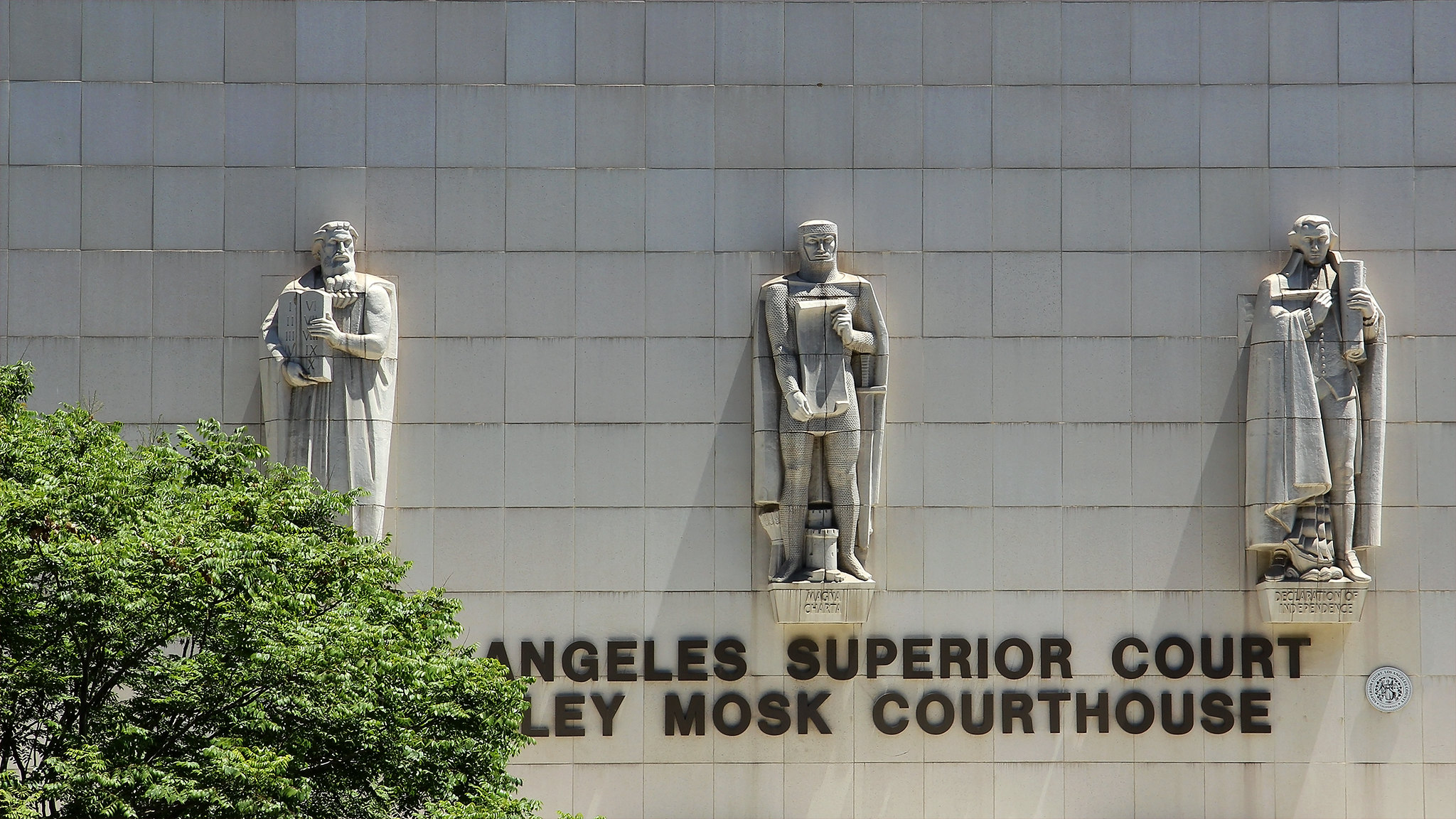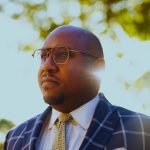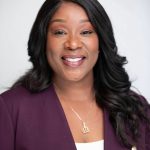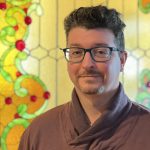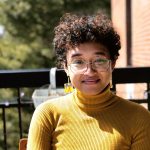Public defenders Ericka Wiley and George Turner are currently running to become judges in Los Angeles Superior Court, a rare undertaking for attorneys in their field. For La Defensa—an organization dedicated to shifting Los Angeles County’s reliance on criminalization and incarceration toward systems of care that center human dignity—the absence of public defenders on the bench is what makes their campaigns so important. Whereas prosecutors, who make up 78 percent of Los Angeles County Superior Court judges, might default to carceral approaches, public defenders are fluent in alternatives to incarceration—alternatives that are often dismissed and underutilized in the courts.
Recognizing this potential, the Justice PAC by La Defensa, a project of Tides Advocacy, launched The Defenders of Justice in 2022. The first iteration of the campaign successfully elected Judge Holly Hancock, the first Black public defender to win a judicial seat in Los Angeles County. Wiley and Turner, the second generation of candidates who are a part of the Defenders of Justice, hope to be the second and third. In 2023 Inquest published an essay by Holly Hancock which explored her reasons for running. This month, Inquest managing editor Adam McGee and assistant editor Daven McQueen spoke to Wiley and Turner about their careers as public defenders, their decision to run, and the decarceral potential for progressive judges to reshape the court.
Adam McGee: Can you both start by introducing yourselves?
Ericka Wiley: I’m a candidate for Los Angeles County judge seat number 48 and a deputy public defender since 1999.
George Turner: I’m a candidate for Los Angeles County judge seat number 39. I’ve been a public defender for 15 years, born and raised in the community where I practice.
McGee: How did you both get involved with La Defensa and the Defenders of Justice’s judicial academy?
Wiley: I was introduced through a former public defender who had run successfully for judge: Holly Hancock. She let me know last summer, “Hey, there’s this judicial leadership academy, which teaches you all of the ins and outs about a judicial run.” The idea of running wasn’t really on my radar before that; I thought of running to become a judge as a thing that DAs did at a certain point in their careers. Holly was the first PD I ever knew personally who ran a judicial campaign successfully. It made me think this was something I might be able to do.
In the academy, you learn how to develop a campaign—from the process of filing paperwork to run, to developing a message, raising money, contacting voters, all of these things I had no idea about—and I was overwhelmed. By the end I was like: This is too much. How am I going to do this with a full-time job? But everyone who participated in the academy was very encouraging. They’re the reason I had the courage to take on this challenge.
Turner: My story is similar—I was working in Compton doing trial after trial. I love the work that I do, love representing members of my community. I actually took over Holly’s position when she became a judge. Similarly, Holly contacted me and said, “Hey, there’s a judicial academy on Saturdays.” Now, Saturdays are usually dedicated to family: I have three little boys and my wife is starting a new practice. I didn’t know how we’d be able to do this. But my wife was very supportive of me and offered to take care of the boys on Saturday—so I did the academy.
In the academy, as Ericka said, we talked through how to run a campaign. In doing that, we were thinking through how to tell the story, how to raise money, coalition-building, scheduling of time, and also the impact that running a campaign can have on your personal life and family. It was a really holistic experience.
McGee: I imagine doing the academy was both invigorating and, like Ericka mentioned, pretty overwhelming. But ultimately, you decided to run. What tipped the decision for you?
Turner: The actual decision to run a campaign to become a judge was tough. Again, I love the work that I do. If you love the work that you do, why would you want to change it? In the end, the bottom line for me was that in California, there’s been a lot of community work around changing the law. As a result, there are new laws on the books about how sentencing and pretrial incarceration are done and what opportunities there are to introduce alternatives to incarceration. But when you walk into the average courtroom, all that’s out the window—whether it’s because the judges are uncomfortable with or not knowledgeable about the changes in the law, I don’t know. That’s a huge problem, in my opinion, and I’m a problem-solver. If I identify a problem, and I know that I’m somebody who can help come to a solution, then I’m willing to stand in the gap and do the work.
Even then, I initially presented the campaign to my wife as though I wasn’t really going to be able to do it, between the kids and the commitment and wanting her to be able to focus on her practice. But she was like: “No, you’re going to run. You’re definitely running. There’s no question about that.” I was like, If you tell me I’m running, then I guess I’m running—and I was off.
McGee: I was struck by the statistic that 78 percent of Los Angeles Superior Court judges are former prosecutors. Like you said, Ericka, becoming a judge seems like it’s seen as something that is a DA thing. But there’s also a high burnout rate among PDs—not many people stay in public defense as long as you both have. What has kept you doing this work for so many years?
Wiley: One thing I’ve loved about the job is that it never gets boring. For example, this November on the ballot there are proposed changes in the law that would drastically alter the way we do our practice, in terms of limiting the options of offering alternatives to incarceration. So you’re always keeping up with the law and modifying your practice to deal with those changes. And in the Los Angeles County Public Defender’s Office, there’s so much variety in terms of the work you can do. I’ve handled misdemeanor traffic cases all the way up to capital murder, where people could potentially be facing the death penalty. There are so many ways to practice this job and still be under the title of public defender. But I think what really has kept me in this job is feeling like public defense is the purest practice of law. You’re not influenced by any sort of political agenda. You’re not influenced by an expectation to win every case or make a whole lot of money. This work really is just motivated by a desire to do the best you can for the person you represent.
Turner: Similarly, this work really feels like part of who I am as a person. I am a natural fighter for the little guy; I’m going to notice injustices, and I’m going to try to rectify them. The work is hard, no doubt about that. I’m representing members of my community, and I see them as human, and the system has a way of raking people over the coals. If you really care, this work can break your heart. But it has to be done.
And when it comes down to it, you’re not doing the work alone. There’s so many of us in the PD’s office, so there’s a wealth of knowledge about how to do the work that we do. We’re all overwhelmed, but we’re pulling through together. I’m not going to quit because I don’t want to let down the person next to me. If the person next to me needs support, I’m going to support them. That camaraderie did make it hard to decide that maybe it’s time to go to the bench. But as I’ve advanced in my career, I’ve started to see reasons to make that kind of change.
McGee: What were some of those reasons?
Turner: It started when I began to notice that newer public defenders would come and watch my trials and ask me for advice. I thought, am I at a point where I’m an older, mentor attorney now? That was one thing—and at the same time, I started seeing prosecutors whom I’d tried cases against getting appointed and elected to the bench. I realized that if I stay where I’m at, there would be times when I would have to call these former prosecutors “your honor.” I knew that I would have a problem with that.
I’m also concerned about the lack of diversity on the bench. What happened is that this older generation of Black and brown judges, who did incredible work in our communities, started to retire. And their seats were often filled by people who didn’t respect their legacy. I realized that if I could make it to the bench, I could continue their work and protect what they stood for. Most judges in L.A. County come from the district attorney’s office, and the bench just doesn’t reflect the diversity of the community. Especially the Black community. As someone who’s part of that generation of Black men lost to mass incarceration, I want us to be seen and heard in every space we can.
More from our decarceral brainstorm
Every week, Inquest aims to bring you insights from people thinking through and working for a world without mass incarceration.
Sign up for our newsletter for the latest.
Newsletter
Wiley: Likewise, being a judge is something I never would have considered in the past. I didn’t see public defenders on the bench, and I definitely didn’t see a lot of Black women on the bench. I self-edited: I was like, This is the spot for me, this is what Black women in the legal profession do. But the bench is becoming more diverse, and I’ve been encouraged by seeing a number of African American judges appointed to the bench. I started thinking maybe this is something I can do as well. Also seeing how the law itself has started to change really made me reconsider.
McGee: Were there any specific changes that made now feel like the right time to take the leap?
Wiley: I never would have considered being a judge when the three-strikes law was in place, for example. I saw how that impacted vulnerable people. The idea of someone with a violent past spending the rest of their life in prison seems very comfortable to many people in our society, but that’s not the way it played out in my practice.
I’d have a young man, thirty years old, who was looking at spending the rest of his life in prison, in part, for crimes committed before he was even an adult, perhaps at the age of sixteen. What were his crimes? He punched a classmate in the face and took his lunch, and because he went to the poorest high school in the county he was arrested for that, rather than being diverted to counseling or given detention. And because he was sixteen, that arrest stuck with him as a strike for the rest of his life. Then, because his record was screwed up as a young man, he didn’t have the ability to get a job. So at age nineteen, he stole from a market, and when the security guard tried to stop him, he elbowed the guard and ran. He got caught, and that’s strike number two, because when you use any amount of force against a person who’s got dominion over property, that’s robbery—a violent offense. Then, years later, he gets into a fight with his girlfriend and says to her, “I’m going to kill you.” He doesn’t become violent, but he’s angry and perhaps under the influence. Strike three. Now this person, at the age of thirty, is looking at spending the rest of his life in prison.
It just didn’t take the form of what people think of as a violent felon who deserves life in prison. This is someone whose life circumstances—and, yes, bad decisions—have gotten him into a tough space. But I’d be begging judges with prosecutorial backgrounds, who had filed these cases for years, not to send the person to prison for the rest of their life. Seeing those laws change, I see the ability to expand the work that I’ve been doing on behalf of the individual, to apply my perspective and employ some empathy, understanding, and a different outlook on the bench.
Daven McQueen: Speaking of empathy on the bench—Ericka, in your work you’ve highlighted the link between mental health and the justice system, especially in considering alternatives to incarceration. If you think about a world where judges prioritize mental health over punishment, what does that look like, and how do you think the courts and judges can start to move toward that vision?
Wiley: The impact of mental illnesses on my practice is significant. I would estimate 75 percent of my clients are suffering from some sort of mental health condition. And in a majority of those cases, that condition has led to them being charged with a crime.
Courts are more likely now to at least recognize that mental health is an issue, but that hasn’t been the case until very recently. In the early 2000s, there were cases where I represented a client whom everyone—the prosecutor, the judge, the police officer who arrested them—knew was severely mentally ill. But when it came to prosecution and sentencing, that really didn’t matter. I would be buried in paperwork to try to show the judge reports from licensed psychologists confirming that, yes, this person is schizophrenic, and they were likely hearing voices when they committed this crime, and what we need to do is get them some help. It felt so clear to me that locking this person up for three years in a cage with other stressed individuals, and then releasing them back into the community with no treatment, did not serve public safety. But it felt like no one cared—or if they did, they didn’t think they had any other options. The court’s solution was to remove this “crazy” person from all the rest of us.
And it’s not just what I’ve seen in my work—it’s personal for me. I have a younger brother who suffers from schizophrenia, and I’ve watched my elderly mother be completely distraught because my brother, deep in the throes of his mental illness, refuses to get treatment. I’ve seen how the criminal legal system has affected him. In the past, it was always about locking him up. But more recently, I’ve seen some positive changes. Lately, it’s been more about getting him treatment. That’s been a game changer, not just for him, but for my clients too.
I’ve been so relieved to be able to go to a client and say: “Look, there’s a program for you. Let’s get you housing, because you’ve been homeless for years; let’s get you mental health treatment and medication. Let’s make it so you’re able to get to a level of stability.” It’s a huge difference from where we were, and it’s encouraging to finally see steps toward addressing the root causes, not just punishing people. We’re actually starting to put people in a position where they can go forward in life.
That said, it still needs to expand. There’s a real lack of resources for people who commit violent crimes while struggling with mental illness. I see that gap every day, and it’s clear we need more support in place for these individuals. The judges on the Superior Court have a lot of influence in this regard. Certainly, they have discretion to apply things like mental health diversions, which gives people who committed a crime due to mental illness a chance to have their case dismissed if they participate in a program that gets them housing, medication, that sort of thing. But, like George was talking about, you walk into the average courtroom and, though these programs exist, they’re not being employed. The judge is the gatekeeper. They’re the ones who participate in discussions about the kinds of non-carceral programs that can be implemented in the courts. They are the ones who can decide, in appropriate cases, to allow these programs to be employed on a larger scale. That’s the impact judges can have: to understand the person’s background, look to reports from mental health professionals, and make decisions based on a true consideration of public safety.
McQueen: I’d imagine non-carceral programs are a more effective approach not just for those experiencing mental illness, but for other populations as well. George, you’ve spent a lot of time working with criminalized youth. Whether through similar programs or other strategies, how would you reimagine the juvenile justice system in ways that support young people rather than criminalizing them? What role can judges play in advancing that?
Turner: First of all, I don’t believe that a criminal court is a good place to start for someone under the age of eighteen who has committed an act that might offend the public. I think that therapy, counseling, and access to resources are much better places to begin. In my experience, many of the problems these kids face come from a lack of resources. And I think we have to reimagine the idea of punishment, particularly with all the knowledge we have now about how our brains develop. The research is clear: the part of the brain that handles impulse control hasn’t finished developing until the age of twenty-five. To treat a sixteen-year-old boy as if he’s an adult isn’t in line with the science.
I once had a client who, on paper, was this very scary kid. He’d committed a lot of violent acts. He had tattoos on his face. He was heavily entrenched in a gang. But I saw him for what he was: a sixteen-year-old boy who had a life full of trauma. He had lost both of his parents before he was ten and had been unhoused since they passed. He started living in a friend’s backyard at the age of eleven, met this group of people whom police might call a gang, but who had been his only family. He told me, “I do what I can to support my family.” In the court, they treated him as if he was a grown man who had made adult decisions. That’s not right. He was a child who was making trauma-informed decisions. And I wondered: What would’ve happened if he’d had resources before he had to live in someone’s backyard?
But to make meaningful changes, we need to reimagine what the courthouse is. Too often, we think of it as a place where “justice” is dispensed—which, really, is a euphemism for “place where people get sentenced to prison.” The courthouse should be community-based: instead of us having to go out and find programs for people, those programs should already be there. There should be a standing mental health worker in the courtroom, for example. These interventions are particularly important for young people. Once you’re sentenced as a youth, it’s likely that you’re going to be back there regularly. So it’s time to reimagine that space, and judges have a key role to play in that transformation.
McGee: Some of our readers are public defenders who, like you both, are thinking about how to use their position to help their clients and dismantle the harms of the system. If they’re considering taking a similar step and running to become a judge, what would you tell them?
Wiley: I would tell any public defender who was interested in running to really consider your life circumstances. George talked about his boys and his family, and I’m also a mom of a three-year-old. It’s going to be worth it, but it’s a lot. Leaving my daughter with her dad in the evenings, when we used to spend time together, to do Zoom calls for democratic clubs and go out and speak on panels has been a real challenge. And this is coming after a full day of work. Back during the primary race, I tried an eight-week special circumstance murder case where my client was looking at spending the rest of her life in prison. That was within days of the election. So running has to be something you can logistically do.
If you can do it, then you’re going to need some support. You have to know the lay of the land. I would say that you definitely need to have a conversation with someone who’s done it. You need to learn about things like getting yourself a treasurer, raising funds, who to connect with in the community, and what endorsements are important in your particular jurisdiction. Having participated in the judicial leadership academy, all of this was much easier because I knew the landscape. I would warn people against just jumping in and trying to do it on their own.
Turner: I agree with everything Ericka said, and would add the need to take care of yourself and know yourself. My partner, who’s a therapist, always offers the following two-part advice. First, make sure you stay in your scope of practice. You have to have sustainable models to do the work that we do, because there’s so much trauma involved. Make sure that you have a very strong base of support, that you have strong coping mechanisms for whatever may come. Second, remember your expertise. Remember that as public defenders, we know this system better than anyone. Public defenders get the opportunity to talk to their clients, but also to law enforcement, bailiffs, and judges. We get to see the entire system and analyze it, and I think that most of us can tell a story about how this criminal legal system is not one that leads to public safety.
As public defenders, we take things apart. We dissect situations and argue specific pieces. And I think those two things—our stories and our analysis—mean we have the skills to be the most democratic version of a judge. Democracy is a bottom-up situation. Public defenders are amazing at starting small and taking things apart from that direction. Despite what they say on television, despite all the national coverage, the reality is that democracy starts at the end of your block. And then at the end of the community you’re in, and then your city, and then in neighboring cities. That’s where democracy starts. And that’s the work we know how to do.
Image: Slices of Life/Flickr
